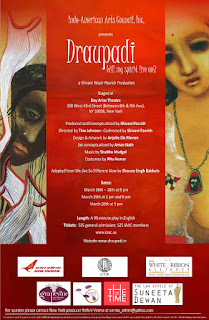Draupadi, a play in English, interweaving tales from the epic past with contemporary Indian life was set to be both a poetic piece of drama and a truly dazzling affair involving the most misunderstood nayika in Indian epics. Some of India’s foremost names in the arts joined together to create a wonderful spectacle, with Ritu Kumar designing costumes, Aman Nath conceptualizing the set design, Anjolie Ela Menon’s intense painting being the signature of the play, and Shubha Mudgal lending her wonderful voice to the production.
The play drew attention to the roles of women in society throughout the ages, through an exploration of the dramatic and compelling figure of Draupadi herself. Centuries have gone by since the Mahabharat war, yet Draupadi is still here. She is found stuck between heaven and earth, roaming the streets and pondering her fate and her choices.
Her only confidant is Lord Krishna. She tries to resolve with him why women must continue to suffer as she had in the past.
Krishna, the orchestrator of fate, leads her to Maaya - a woman of today, who has suffered much abuse at the hands of society. A distraught Maaya attempts suicide, but Draupadi stops her and offers her help in return for a favor.
Maaya treads through her life in Draupadi’s footsteps, and in the end she too has to make a choice between revenge or resilience. She becomes Draupadi’s salvation, and Krishna is able to address centuries old smoldering wounds.
The play drew attention to the roles of women in society throughout the ages, through an exploration of the dramatic and compelling figure of Draupadi herself. Centuries have gone by since the Mahabharat war, yet Draupadi is still here. She is found stuck between heaven and earth, roaming the streets and pondering her fate and her choices.
Her only confidant is Lord Krishna. She tries to resolve with him why women must continue to suffer as she had in the past.
Krishna, the orchestrator of fate, leads her to Maaya - a woman of today, who has suffered much abuse at the hands of society. A distraught Maaya attempts suicide, but Draupadi stops her and offers her help in return for a favor.
Maaya treads through her life in Draupadi’s footsteps, and in the end she too has to make a choice between revenge or resilience. She becomes Draupadi’s salvation, and Krishna is able to address centuries old smoldering wounds.
The play, enacted in front of a small audience at the Roy Arias Theatre, concluded with an interactive Q&A session between the audience, the actors and the dancers (yes, there was also a small Odissi duet, a la Bollywood style, where no production is complete without a song and dance sequence). The audience and the actors discussed their interpretation of the work, and a psychologist from the audience even explained his take on 'revenge' and 'forgiveness'.





No comments:
Post a Comment